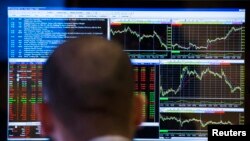A British judge granted bail Wednesday to a stock trader accused of manipulating the U.S. stock market and helping to cause a major index to plummet 600 points in just five minutes in 2010.
Navinder Singh Sarao of London was ordered to provide a security bond of $7.4 million — the amount he has in his trading account. He also was ordered to surrender his passport and report to a police station three times a week while he fights extradition to the United States. He was to remain jailed in London for at least one night.
The U.S. Justice Department has charged Sarao with fraud and commodities manipulation. The charges have "come as a bolt from the blue for Mr. Sarao," his attorney, Joel Smith, told the court.
Sarao is accused of using an automated stock trading program to do something the Justice Department called "dynamic layering." It involved placing many large-volume sell orders at different price points to create the appearance of a large supply. It is alleged that when this tactic caused prices to fall, Sarao canceled his orders, bought contracts at lower prices, and sold them when prices recovered — reaping a roughly $40 million profit, U.S. authorities said.
Sarao's alleged manipulation, prosecutors argue, contributed to a "flash crash" of the Dow Jones industrial average in New York; it fell about 600 points in just minutes on May 6, 2010, wiping out nearly $1 trillion in market value before bouncing back. Such a quick, sharp drop could have caused a global financial panic.
CME Group, where Sarao conducted his trades, said Wednesday in a statement that "the flash crash was not caused by the futures market." CME added that it was prohibited by law from releasing any information about Sarao's trading.
The case against Sarao marks the first time that U.S. investigators have said market manipulation contributed to the sharp drop in 2010. Earlier, they said the drop had been caused by various factors, including a computer-driven trade by a mutual fund.
Sarao was first contacted in 2009 by regulators who questioned his trading activity, but the "spoofing" he engaged in continued until recently, according to the U.S. Commodity Futures Trading Commission.
The head of the CFTC said Wednesday that it took nearly five years to charge Sarao because of the size and complexity of U.S. financial markets.
Some information for this report came from Reuters.










